Why can't Xiaomi be as expensive as Samsung or Apple?
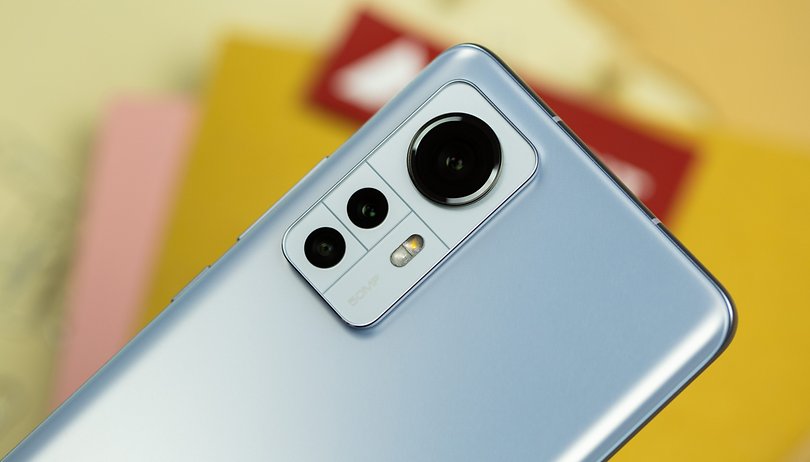

The Xiaomi 12 is more expensive than the Xiaomi Mi 11 or the Samsung Galaxy S22 and almost as expensive as the Apple iPhone 13. Huh, what? That's supposed to offend me? Well, no. I wonder why Xiaomi is not allowed to be as expensive (or more) than Samsung or Apple.
Xiaomi raised its prices, big deal. Why is this such a problem? Why is it that a Samsung flagship at 1000 dollars is normal but not when it's Xiaomi? Well, obviously I'm playing a little provocative with this semi-rhetorical question. But I find it funny that the third-largest smartphone manufacturer in the world is being criticized for increasing the prices on its flagship range.
Xiaomi's premium strategy is not new and is an almost natural evolution for all emerging Chinese manufacturers as their market share increases (cue OnePlus). Except that Xiaomi has a major advantage over the others, its huge catalog. However, we must not forget that Xiaomi still has a lot of progress to make to be equal to Samsung or Apple and thus justify its pricing policy.
- Read our Xiaomi vs Samsung and Samsung vs iPhone comparisons to decide between the 3 biggest smartphone manufacturers
You weren't going to buy the Xiaomi 12 anyway
I also grumble every time a smartphone is more expensive than its predecessor. It's a natural reaction, but manufacturers know they can get away with it, at least to some degree. If a product is so essential to consumers, an increase in its price doesn't decrease demand, quite the opposite. Buyers will even reduce consumption of other goods to allocate more of their budget to the desired item.
Water, bread, or toilet paper are good examples. But, in 2022 and in the age of web 3.0, the smartphone is seriously approaching an essential level too, at least in some aspects. No matter how expensive it is, a smartphone will always find people willing to buy it. Even more so if it's a flagship, whose "coolness" generates a sense of ownership among those who buy it. I'm not going to give you another essay on the economics of hype.
| Xiaomi 12/12 Pro | Xiaomi Mi 11 | Samsung Galaxy S22/S22+ | iPhone 13/13 Pro | |
|---|---|---|---|---|
| Price | 8/128 GB: $749 Pro 12/256 GB: $999 |
8/128 GB: $850 No pro model in Europe or US |
S22 8/128 GB: $799 S22+ 8/128 GB: $1049 |
128 GB: $799 Pro 128 GB: $999 |
| *As Xiaomi does not sell smartphones in the US, we used the global MSRP or conversion of prices in Europe | ||||
But, we must also recontextualize all this by reminding that this share of buyers immune to inflation and indifferent to the quality/price ratio, is small minority. Take any market study or survey on the criteria for buying a smartphone and the majority of consumers set their budget at 300 or even 400 dollars maximum. Almost no one is willing to pay a minimum wage for a phone in developed countries.
And I'm sure this pattern can be traced back to Xiaomi itself. In other words, almost nobody was going to buy the Xiaomi 12. The bulk of the smartphones sold by Xiaomi are Redmi. In the top 10 best-selling smartphones of 2021(Counterpoint), the two Xiaomi ranked are the Redmi 9A and Redmi 9.
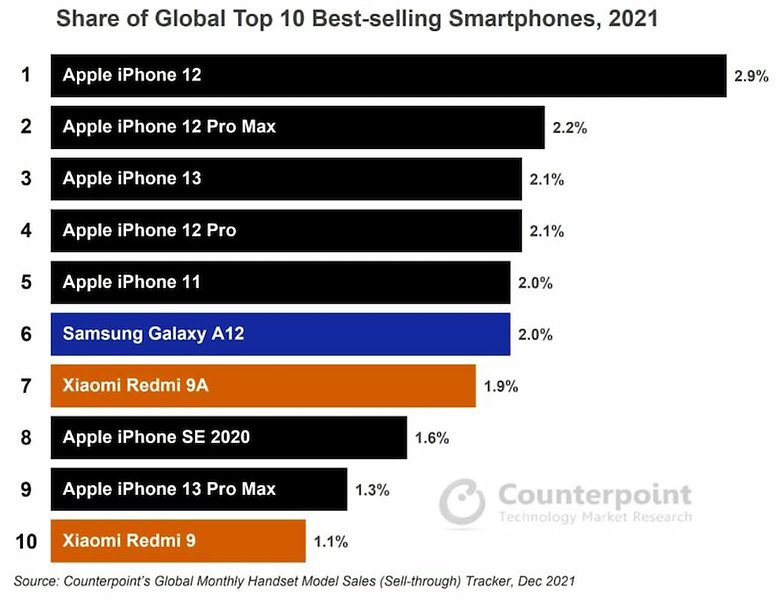
That's exactly why I don't blame Xiaomi for offering more expensive flagship devices. Flagship will be expensive in any case, sorry to say. But Xiaomi also offers countless alternatives. This year alone, you can choose from 5 new Redmi with prices ranging from around $200 (Redmi 10) to approximately $440 (Redmi Note 11 Pro+ 5G, both after conversion). And these Redmi are often more competitive than the few Galaxy A's that come out every year.
Price is not everything
However, I also understand that Xiaomi's premium strategy is not totally legitimate in the eyes of its detractors. It's all very well to offer a whole range of cheaper mid-range alternatives. But if I absolutely want to buy a flagship, can Xiaomi really be interchangeable with Samsung, for example?
Does a Xiaomi 12 selling for $749 offer an experience as premium as a Galaxy S22 selling for $799? Personally, I don't think so. Xiaomi still has a lot of work to do, especially on the software experience. I'm not talking about the quality of MIUI, which is an overlay I like in terms of features.
- Read our guide to the best features of MIUI
But Samsung is definitely more advanced on the Android update policy, for example. And the South Korean manufacturer does not systematically display ads in its interface (at least in the West). I find that the photo experience also plays in favor of Samsung against Xiaomi.
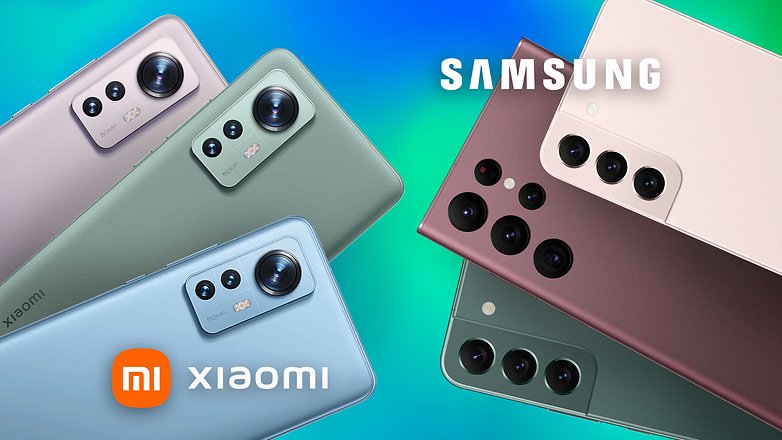
Conversely, I prefer Xiaomi in terms of performance with the Snapdragon 8 Gen 1 superior to the Exynos 2200 used in the European Galaxy S22. And battery life is often a strong point of the Chinese manufacturer, as well as fast charging. Two points on which Samsung is very late. You can see that the answer to my initial question is not obvious enough.
Xiaomi is not a perfect substitute for its premium competitors, in the sense that the Xiaomi 12 is not fully interchangeable with a Galaxy S22. To finish this opinion post that is starting to drag, I would say that Xiaomi's flagships price increase is not 100% legitimate.
Xiaomi is not yet the equivalent of Samsung or Apple. But, Xiaomi already has much more legitimacy to offer smartphones at 1000 dollars than any other Chinese manufacturer, in my opinion. I'm thinking in particular of Oppo, which, apart from its excellent Find X5 Pro, offers very few competitive smartphones, especially in the mid-range. This does not prevent it from charging higher prices than Samsung.
The moral of the story is that no one cares about flagships prices. Nobody buys them and what really matters are the alternatives that each manufacturer offers in the more affordable segments, which people actually buy. And on this point, Xiaomi is ahead of the game.
What do you think about it? Am I overreacting, as usual? Was Xiaomi right to raise its prices? Would you have bought the Xiaomi 12 if it was cheaper? If so, how much of a discount would it take to push you to buy? Or maybe you find the price quite consistent?










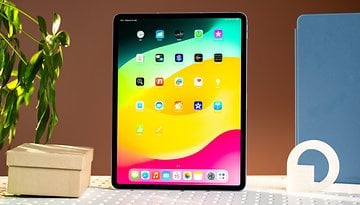
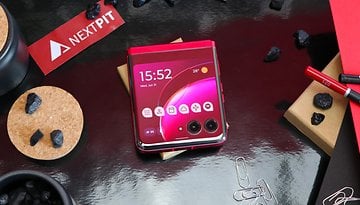




Because Xiaomi is suspect with spyware from China government.
Because their skin is ad based, which, even if you turn off the ads, is still collecting data on you.
Because Xiaomi doesn't have the demonstrated quality.
Because perception is reality-it's not a prestige brand.
In the US, it's more hassle to find and buy.